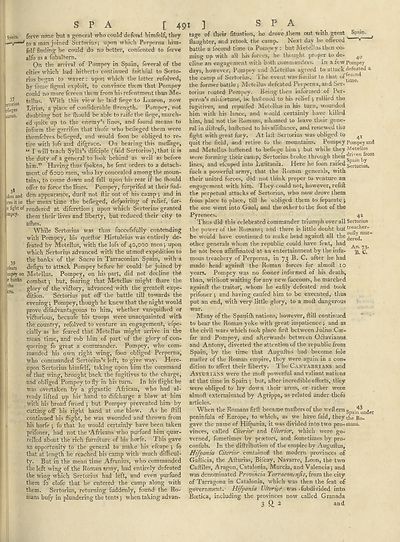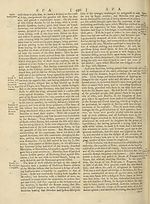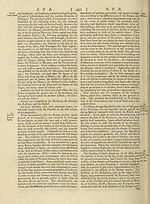Encyclopaedia Britannica, or, a Dictionary of arts, sciences, and miscellaneous literature : enlarged and improved. Illustrated with nearly six hundred engravings > Volume 19, Scripture-SUG
(539) Page 491
Download files
Complete book:
Individual page:
Thumbnail gallery: Grid view | List view

SPA
[ 49* 1
S P A
I 37
fcrtorius
i.fieges
iuron.
3*
akes and
ms it in
e fight of
impey.
Soain. ferve none but a general who could defend himfelf, they
.—Y—^ to a man joined Sertwifts; upon which Perperna him¬
felf finding he could do no better, confented to ferve
alfo as a fubaltern.
On the arrival of Pompey in Spain, feveral of the
cities which had hitherto continued faithful to Serto-
rius began to waver : upon which the latter refolved,
by feme Itgnal exploit, to convince them that Pompey
could no more fcreen them from his refentment thaai Me-
tellus. With this view he laid liege to Lauron, now
Lirias, a place of confiderable ftrength. Pompey, not
doubting but he (bould be able to raiie the liege, march¬
ed quite up to the enemy’s lines, and found means to
inform the garrifon that thofe who beiieged them were
themfelves. beiieged, and would foon be obliged to re¬
tire with lofs and difgrace. On hearing this meffage,
“ I will teach Sylla’s difciple (faid Sertorius), that it is
the duty of a general to look behind as well as before
him.” Having thus fpoken, he fent orders to a detach¬
ment. of 6ooo men, who lay concealed among the moun¬
tains, to come down and fall upon his rear if he fhould
offer to force the lines. Pompey, furprifed at their hid¬
den appearance, durll not ftir out of his camp 5 and in
the mean time the beiieged, defpairing of relief, iur-
rendered at difcretion 5 upon which Sertorius granted
them their lives and liberty, but reduced their city to
allies.
While Sertorius was thus fuccefsfully contending
with Pompey, his queftor Hirtuleius was entirely de¬
feated by Metellus, with the lofs of 40,000 men j upon
which Sertorius advanced with the utmoll expedition to
the banks of the Sucro in Tarraconian Spain, with a
delign to attack Pompey before he could be joined by
Metellus. Pompey, on his part, did not decline the
combat •, but, fearing that Metellus might fhare the
glory of the vidlory, advanced with the greateft expe¬
dition. Sertorius put off the battle till towards the
evening; Pompey, though he knew that the night would
prove difadvantageous to him, whether vanquilhed or
victorious, becaufe his troops were unacquainted with
the country, refolved to venture an engagement, efpe-
cially as he feared that Metellus might arrive in the
mean time, and rob him of part of the glory of con¬
quering fo great a commander. Pompey, who com¬
manded his own right wing, foon obliged Perperna,
who commanded Sertorius’s left, to give way. Here¬
upon Sertorius himfelf, taking upon him the command
of that wing, brought back the fugitives to the charge,
and obliged Pompey to fly in his turn. In his flight he
was overtaken by a gigantic African, wfoo had al¬
ready lifted up his hand to difeharge a blow at him
with his broad fword ; but Pompey prevented him by
Cutting off his right hand at one blow. As he ftill
continued his flight, he was wounded and thrown from
his horfe ; fo that he would certainly have been taken
prifoner, had not the Africans who purfued him quar¬
relled about the rich furniture of his horfe. This gave
an opportunity to the general to make his efcape ; fo
that at length he reached his camp with much difficul¬
ty. But in the mean time Afranius, who commanded
the left wing of the Roman army, had entirely defeated
the wing W’hich Sertorius had left, and even purfued
them fo clofe that he entered the camp along with
them. Sertorius, returning fuddenly, found the Ro¬
mans bufy in plundering the tents; when taking advan-
39
,;feats
rnpey on
1 e banks
the
tage of their fituation, he drove them out with great sP?tn- t
daughter, and retook the camp. Next day he offered “V——'
battle a lecond time to Pompey : but Metellus then co¬
ming up with all his forces, he thought proper to de- 40
cline an engagement with both commanders. In a few p0mpey
days, however, Pompey and Meteilus agreed to attack defeated a
the camp of Sertorius. 1 he event was fimilar to that of
the former battle; Metellus defeated Perperna, and Ser¬
torius routed Pompey. Being then informed of Per-
perna’s misfortune, Ire haftened to his relief ; rallied the
fugitives, and repuiled Metellus in his turn, wounded
him with his lance, and would certainly have killed
him, had not the Romans, alhamed to leave their gene¬
ral in dill refs, haftened to his affiftance, and renewed the
fight with great fury. At lafl Sertorius was obliged to 4l
quit the field, and retire to the mountains. Pompey Pompeyand
and Metellus haftened to befiege him ; but while they Metellus
were forming their camp, Sertorius broke through their kn^rom
lines, and ef'eaped into Lufitania. Here he foon raifed Seitorim.
fuel) a powerful army, that the Roman generals, with
their united forces, did not think proper to venture an
engagement with him. They could not, however, refill:
the perpetual attacks of Sertorius, who now drove them
from place to place, till he obliged them to leparate ;
the one went into Gaul,- and the other to the foot of the
Pyrenees. 42
Thus did this celebrated commander triumph over all Sertorius
the power of the Romans; and there is little doubt but11®^0^^"
be Would have continued to make head againff all thejere(j>
other generals whom the republic could have fent, had Ari
he not been affaffinated at an entertainment by the infa- c.
mous treachery of Perperna, in 73 B. C. after he had
made head againft the Roman forces for almofi: 10
years. Pompey was no fooner informed of his death*
than, without waiting for any new fuccours, he marched
againft the traitor, whom he eafily defeated and took
prifoner ; and having caufed him to be executed, thus
put an end, with very little glory, to a moil dangerous
war.
Many of the Spanifh nations, however, ftill continued
to bear the Roman yoke with great impatience; and as
the civil wars which took place firlt between Julius Cae-
far and Pompey, and afterwards between Odlavianus
and Antony, diverted the attention of the republic from
Spain, by the time that Auguftus had become foie
mailer of the Roman empire, they were again in a con¬
dition to affert their liberty. The Cantabrians and
Asturians were the moft powerful and valiant nations
at that time in Spain ; but, after incredible efforts, they
were obliged to lay doAvn their arms, or rather were
almoft exterminated by Agrippa, as related under thefe
articles.
When the Romans firft became rnaftersof the weflern Sl)ail^n{jets
peninfula of Europe, to which, as we have faid, they the, Ro-
gave the name of Hifpania, it was divided into twro pro- mans,
vinces, called Citerior and Ulterior, which were go¬
verned, fometimes by praetors, and fometinaes by pro-
confuls. In the diftribution of the empire by Auguftus,
Hifpania, Citerior contained the modern provinces of
Gallicia, the Afturias, Bifcay, Navarre, Leon, the two
Caftiles, Aragon, Catalonia, Murcia, and Valencia; and
xvas denominated Provincia TarraconenJtj, from the city
of Tarragona in Catalonia, which was then the feat of
government. Hifpania Ultvripr vvas Subdivided into
Baetica, including the provinces noxv called Granada
3 Q. 2 and
[ 49* 1
S P A
I 37
fcrtorius
i.fieges
iuron.
3*
akes and
ms it in
e fight of
impey.
Soain. ferve none but a general who could defend himfelf, they
.—Y—^ to a man joined Sertwifts; upon which Perperna him¬
felf finding he could do no better, confented to ferve
alfo as a fubaltern.
On the arrival of Pompey in Spain, feveral of the
cities which had hitherto continued faithful to Serto-
rius began to waver : upon which the latter refolved,
by feme Itgnal exploit, to convince them that Pompey
could no more fcreen them from his refentment thaai Me-
tellus. With this view he laid liege to Lauron, now
Lirias, a place of confiderable ftrength. Pompey, not
doubting but he (bould be able to raiie the liege, march¬
ed quite up to the enemy’s lines, and found means to
inform the garrifon that thofe who beiieged them were
themfelves. beiieged, and would foon be obliged to re¬
tire with lofs and difgrace. On hearing this meffage,
“ I will teach Sylla’s difciple (faid Sertorius), that it is
the duty of a general to look behind as well as before
him.” Having thus fpoken, he fent orders to a detach¬
ment. of 6ooo men, who lay concealed among the moun¬
tains, to come down and fall upon his rear if he fhould
offer to force the lines. Pompey, furprifed at their hid¬
den appearance, durll not ftir out of his camp 5 and in
the mean time the beiieged, defpairing of relief, iur-
rendered at difcretion 5 upon which Sertorius granted
them their lives and liberty, but reduced their city to
allies.
While Sertorius was thus fuccefsfully contending
with Pompey, his queftor Hirtuleius was entirely de¬
feated by Metellus, with the lofs of 40,000 men j upon
which Sertorius advanced with the utmoll expedition to
the banks of the Sucro in Tarraconian Spain, with a
delign to attack Pompey before he could be joined by
Metellus. Pompey, on his part, did not decline the
combat •, but, fearing that Metellus might fhare the
glory of the vidlory, advanced with the greateft expe¬
dition. Sertorius put off the battle till towards the
evening; Pompey, though he knew that the night would
prove difadvantageous to him, whether vanquilhed or
victorious, becaufe his troops were unacquainted with
the country, refolved to venture an engagement, efpe-
cially as he feared that Metellus might arrive in the
mean time, and rob him of part of the glory of con¬
quering fo great a commander. Pompey, who com¬
manded his own right wing, foon obliged Perperna,
who commanded Sertorius’s left, to give way. Here¬
upon Sertorius himfelf, taking upon him the command
of that wing, brought back the fugitives to the charge,
and obliged Pompey to fly in his turn. In his flight he
was overtaken by a gigantic African, wfoo had al¬
ready lifted up his hand to difeharge a blow at him
with his broad fword ; but Pompey prevented him by
Cutting off his right hand at one blow. As he ftill
continued his flight, he was wounded and thrown from
his horfe ; fo that he would certainly have been taken
prifoner, had not the Africans who purfued him quar¬
relled about the rich furniture of his horfe. This gave
an opportunity to the general to make his efcape ; fo
that at length he reached his camp with much difficul¬
ty. But in the mean time Afranius, who commanded
the left wing of the Roman army, had entirely defeated
the wing W’hich Sertorius had left, and even purfued
them fo clofe that he entered the camp along with
them. Sertorius, returning fuddenly, found the Ro¬
mans bufy in plundering the tents; when taking advan-
39
,;feats
rnpey on
1 e banks
the
tage of their fituation, he drove them out with great sP?tn- t
daughter, and retook the camp. Next day he offered “V——'
battle a lecond time to Pompey : but Metellus then co¬
ming up with all his forces, he thought proper to de- 40
cline an engagement with both commanders. In a few p0mpey
days, however, Pompey and Meteilus agreed to attack defeated a
the camp of Sertorius. 1 he event was fimilar to that of
the former battle; Metellus defeated Perperna, and Ser¬
torius routed Pompey. Being then informed of Per-
perna’s misfortune, Ire haftened to his relief ; rallied the
fugitives, and repuiled Metellus in his turn, wounded
him with his lance, and would certainly have killed
him, had not the Romans, alhamed to leave their gene¬
ral in dill refs, haftened to his affiftance, and renewed the
fight with great fury. At lafl Sertorius was obliged to 4l
quit the field, and retire to the mountains. Pompey Pompeyand
and Metellus haftened to befiege him ; but while they Metellus
were forming their camp, Sertorius broke through their kn^rom
lines, and ef'eaped into Lufitania. Here he foon raifed Seitorim.
fuel) a powerful army, that the Roman generals, with
their united forces, did not think proper to venture an
engagement with him. They could not, however, refill:
the perpetual attacks of Sertorius, who now drove them
from place to place, till he obliged them to leparate ;
the one went into Gaul,- and the other to the foot of the
Pyrenees. 42
Thus did this celebrated commander triumph over all Sertorius
the power of the Romans; and there is little doubt but11®^0^^"
be Would have continued to make head againff all thejere(j>
other generals whom the republic could have fent, had Ari
he not been affaffinated at an entertainment by the infa- c.
mous treachery of Perperna, in 73 B. C. after he had
made head againft the Roman forces for almofi: 10
years. Pompey was no fooner informed of his death*
than, without waiting for any new fuccours, he marched
againft the traitor, whom he eafily defeated and took
prifoner ; and having caufed him to be executed, thus
put an end, with very little glory, to a moil dangerous
war.
Many of the Spanifh nations, however, ftill continued
to bear the Roman yoke with great impatience; and as
the civil wars which took place firlt between Julius Cae-
far and Pompey, and afterwards between Odlavianus
and Antony, diverted the attention of the republic from
Spain, by the time that Auguftus had become foie
mailer of the Roman empire, they were again in a con¬
dition to affert their liberty. The Cantabrians and
Asturians were the moft powerful and valiant nations
at that time in Spain ; but, after incredible efforts, they
were obliged to lay doAvn their arms, or rather were
almoft exterminated by Agrippa, as related under thefe
articles.
When the Romans firft became rnaftersof the weflern Sl)ail^n{jets
peninfula of Europe, to which, as we have faid, they the, Ro-
gave the name of Hifpania, it was divided into twro pro- mans,
vinces, called Citerior and Ulterior, which were go¬
verned, fometimes by praetors, and fometinaes by pro-
confuls. In the diftribution of the empire by Auguftus,
Hifpania, Citerior contained the modern provinces of
Gallicia, the Afturias, Bifcay, Navarre, Leon, the two
Caftiles, Aragon, Catalonia, Murcia, and Valencia; and
xvas denominated Provincia TarraconenJtj, from the city
of Tarragona in Catalonia, which was then the feat of
government. Hifpania Ultvripr vvas Subdivided into
Baetica, including the provinces noxv called Granada
3 Q. 2 and
Set display mode to:
![]() Universal Viewer |
Universal Viewer | ![]() Mirador |
Large image | Transcription
Mirador |
Large image | Transcription
Images and transcriptions on this page, including medium image downloads, may be used under the Creative Commons Attribution 4.0 International Licence unless otherwise stated. ![]()
| Permanent URL | https://digital.nls.uk/192702289 |
|---|
| Attribution and copyright: |
|
|---|
| Description | Ten editions of 'Encyclopaedia Britannica', issued from 1768-1903, in 231 volumes. Originally issued in 100 weekly parts (3 volumes) between 1768 and 1771 by publishers: Colin Macfarquhar and Andrew Bell (Edinburgh); editor: William Smellie: engraver: Andrew Bell. Expanded editions in the 19th century featured more volumes and contributions from leading experts in their fields. Managed and published in Edinburgh up to the 9th edition (25 volumes, from 1875-1889); the 10th edition (1902-1903) re-issued the 9th edition, with 11 supplementary volumes. |
|---|---|
| Additional NLS resources: |
|

